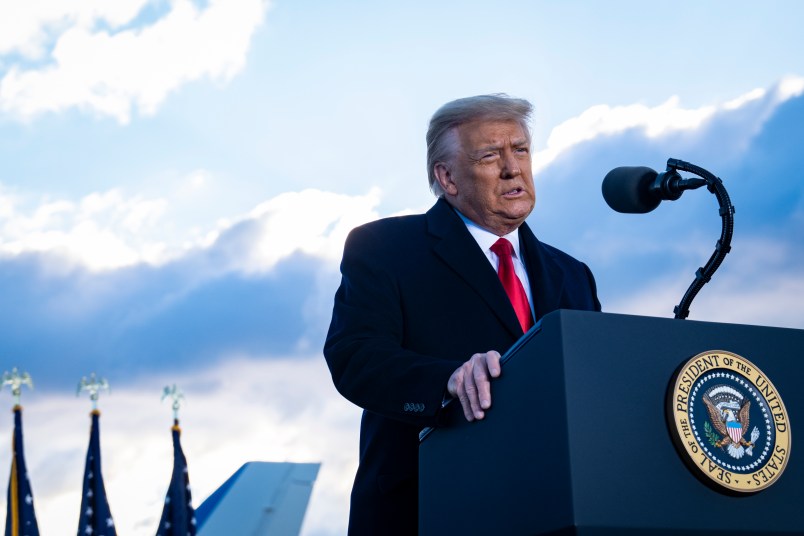Republicans senators are beginning to coalesce around a new talking point: impeaching former President Donald Trump is now unconstitutional because he has left office.
“I think it’s obvious that the post-presidential impeachment has never occurred in the history of the country for a reason: that it’s unconstitutional, that it sets a bad precedent for the presidency and it continues to divide the nation,” Sen. Lindsey Graham (R-SC) told reporters Friday.
Constitutional scholars of all stripes are dismissing that argument.
“I don’t buy that argument as anything other than an argument of convenience (e.g., looking for an excuse to avoid what should be easy and seemed politically hard),” Justin Levitt, a constitutional law professor at Loyola Law School, told TPM in an email.
Experts TPM spoke with focused on two primary points: the possibility to bar a convicted person from holding office again, and the historical precedents at play.
“If it were unconstitutional to finish impeachment proceedings for a former official, then Congress would never be able to ban officials from future office: the subject official would just resign moments before the Senate vote,” Levitt said. “In order to give meaning to the constitutional text, the official can’t control that process of disqualification for serious misconduct. Which means it has to apply to former officials as well.”
The over 150 constitutional law scholars who signed a letter affirming the constitutionality of impeaching a former president came to the same conclusion, calling the prohibition from future office clause an “important deterrent against future misconduct” for former officials.
They also argue in the letter that the Framers were singularly concerned about a “demagogue” who could rise to power and overthrow the republican government. The Framers knew, the scholars wrote, that such a person’s power and influence doesn’t evaporate just because he’s left office. He could rise again.
“The Framers devised the disqualification power to guard against that possibility, and would surely disagree that a person who sought to overthrow our democracy could not be disqualified from holding a future office of the United States because the plot reached its crescendo too close to the end of his or her term,” they wrote.
Despite Graham’s assertion, there’s also some historical precedent to work from here.
“It happened before,” said Erwin Chemerinsky, dean of the UC Berkeley School of Law, who agrees that impeaching a former president is constitutional. “William Belknap, Secretary of War under Ulysses Grant, resigned and then was impeached and tried.”
The signatories on the letter cited the Belknap episode as relevant precedent too, noting that the Constitution’s impeachment provisions “apply to presidents, vice presidents, and civil officers alike.”
The group on the other side of the argument is much smaller, and helmed by Alan Dershowitz. He argued in a Wall Street Journal opinion piece that better precedent than Belknap’s is the House’s decision not to impeach former President Richard Nixon in 1974.
“For the victorious Democrats to seek revenge against Donald Trump would set a terrible precedent, distract from President Biden’s agenda, and make it hard to heal the country,” he concluded. “Better to move on.”
Larry Tribe, a professor of constitutional law emeritus at Harvard Law School, dismissed the argument made by Dershowitz and the “tiny smattering of lawyers who agree with him.”
“To render this uniquely appropriate remedy unavailable simply because the gravest abuses of power were committed near the very end of a president’s term would be bizarre at best, self-sabotaging at worst,” he wrote in the Washington Post. “Nothing in the Constitution suggests that a president who has shown himself to be a deadly threat to our survival as a constitutional republic should be able to run out the clock on our ability to condemn his conduct and to ensure that it can never recur.”



